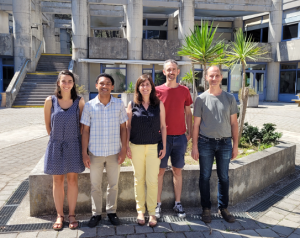Presentation of WP5 Sustainability Assessment
The overall goal of WP 5, led by ARMINES, is to evaluate and compare the potential environmental, economic and social impacts of energy production from microalgal biogas with and without the early-warning technologies developed in PRODIGIO and to identify the most sensitive aspects to be considered for future commercial application. To do so, global sustainability is assessed following a life cycle perspective to account for the effects over the whole biogas production chain.

Environmental life cycle assessment.
Environmental life cycle assessment (LCA) is being applied according to the 4 phases of ISO 14040 and 14044 standards (2006), namely the goal and scope definition, inventory analysis, life cycle impact assessment and interpretation. The activities conducted to date have mainly focused on the goal and scope definition and the inventory analysis phases.
ARMINES started data collection on both cultivation and anaerobic digestion stages to identify the process stages and input and output flows within the system boundaries and to build the life cycle inventories. To do so, ARMINES prepared two models of surveys, for the microalgae production and the anaerobic digestion, respectively. The process was enriched through discussions with external experts such as the BIOCORE research team at Villefranche Oceanographic Observatory, in the South of France.
In addition to the quantification of input and output flows, LCA modelling also requires estimates of the biomass and biogas production rates. To assess the improvement of early warning systems compared to systems without this component, a dynamic model is currently under development. To this end, ARMINES has been studying existing models, mainly developed in Matlab, and the adaptations needed to be implemented in a compatible environment with available LCA tools in order to apply them to PRODIGIO case study.
Next steps will involve the application of the model to obtain the environmental LCA results for a selection of relevant impact categories.
Social life cycle assessment.
The literature review to define the scope of the Social LCA is also ongoing. Two possible approaches are being considered: a reporting approach based on performance reference points (type I) and an impact pathway approach based on the identification of cause-effect chains (type II). The advantages and drawbacks of each approach are being analysed so as to select of the most suitable approach for the PRODIGIO context.
Economic assessment and life cycle sustainability.
After completing the environmental and social analysis, an economic assessment will be conducted, using a process simulation tool to complement the experimental data. Finally, results for the three dimensions will be interpreted to provide conclusions and recommendations on the sustainability of the process.

